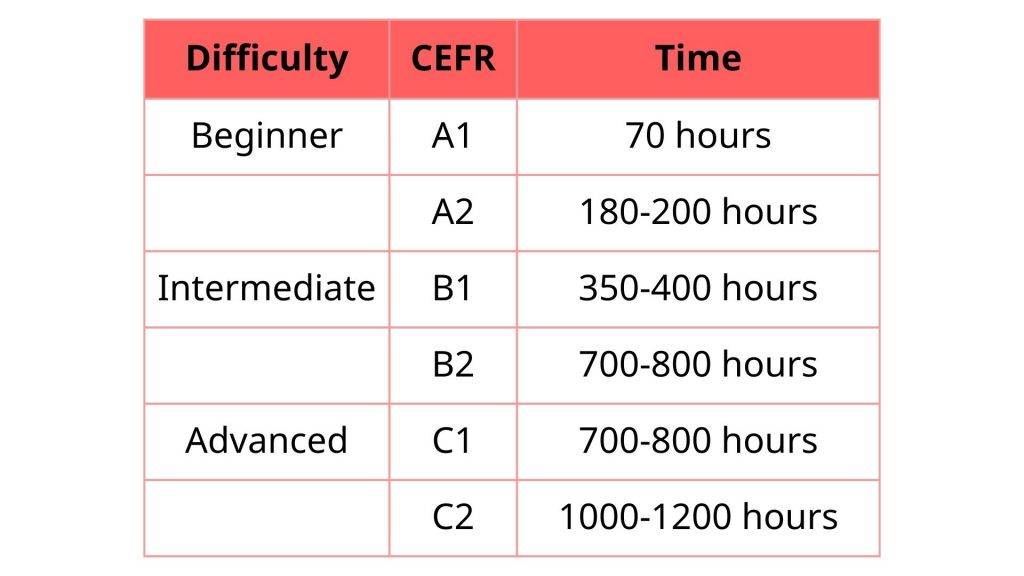How long does it take to learn English? How long does it take to become fluent in English, to be more specific? The common consensus states that it typically takes anywhere between 70 and over 1100 hours to learn conversational English. The time really depends on the level that you want to reach. Needless to say, the reason the range is so wide is that the question of how long it is a complicated one and the answer can vary depending on a variety of different factors.
It can serve as a great benefit to have a more concrete understanding of the time and effort needed to meet an objective like learning a language in order for you to prepare yourself for the journey ahead. In this article, we are going to discuss how long it usually takes to learn English for different level as we use CEFR as our standard, and offer some tips on how to speak English fluently. Let’s get started.


Table of Contents
Reaching Beginner Level: A1-A2 (70-150 Hours)
Beginner English users should start at this level. After your beginner English lessons you should come out with a limited command of the language and be able to function in ordinary scenarios thanks to common expressions and basic vocabulary. You will be able to engage in a little bit of small talk and voice your opinions, but only on the topics you are familiar with and in very basic ways.
CEFR A1
According to the CEFR, it takes around 70 hours of regular study time to reach the A1 level. At this level, you will learn how to effectively communicate with others when they speak slowly and clearly, how to greet them, introduce yourself and others, and understand basic phrases and expressions.
CEFR A2
Around 180–200 hours of regular study time needs to be put in to reach the A2 level. By the end of this level, you should be able to comprehend commonly used expressions, exchange basic info, and discuss topics of urgent importance.
Reaching Intermediate Level: B1-B2 (400-600 Hours)
The intermediate level is the level for independent users. An independent user can comprehend the main ideas expressed through simple and common language. It is believed that a B1 user may function effectively when traveling and can take part in straightforward discourse. In essence, it marks the onset of independent speaking and usage.
CEFR B1
B1 level requires roughly 350-400 hours of regular study time. After completing this level, you should be able to grasp the major points of discussion about familiar topics, have enough vocabulary required for travel, write short and simple text, and convey aspirations, goals, schedules, and events.
CEFR B2
B2 takes 500-600 hours of regular study time. At this level, you will be able to grasp texts that are more challenging, whether at an abstract, concrete, or technical level, take part in conversations more fluidly, come up with clear language off the dome, communicate and back up your points of view, and write in a variety of styles.
Reaching Advanced Level: C1-C2 (900-1100 Hours)
The advanced level is intended for proficient English speakers. After these C level advanced English classes, students should be able to hold their own in more complex arguments, freely engage with native speakers, and compose complex written pieces. They should also be able to understand main ideas and the subtext in a given text.
CEFR C1
A regular study schedule of 700–800 hours is needed to complete Level C1. At this level, you should be able to comprehend texts that are lengthier and more complicated and their implied meanings, converse freely and spontaneously with others, express yourself, and use English in a variety of ways. You should also be able to produce clear, detailed writing with a firm command of all grammatical concepts. If you want to work for an international corporation, it is crucial for you to level up your English to at least C1. You would then be able to communicate with foreign clients, customers or business parters without any troubles.
CEFR C2
The C2 level requires around 1000–1200 hours of regular study time. At this level, you should be able to comprehend the majority of what you hear and read in English, summarize the points of documents and dialogues, recount the ideas behind arguments, and flawlessly incorporate language subtleties in casual conversation.
| Difficulty | Level | Time | Learned Abilities |
| Beginner | CEFR A1 | 70 hours | greetings, introduction, basic phrases and expressions |
| CEFR A2 | 180-200 hours | comprehend commonly used expressions, exchange basic info, and topics of urgent importance | |
| Intermediate | CEFR B1 | 350-400 hours | know vocabulary required for travel, write short and simple text, and convey aspirations, goals, schedules, and events |
| CEFR B2 | 500-600 hours | read texts at an abstract, concrete, or technical level, take part in conversations fluidly, come up with clear language off the dome, convey and back up an argument, and write in a variety of styles | |
| Advanced | CEFR C1 | 700–800 hours | can understand longer and more complicated texts and subtext, converse freely and spontaneously with others, express yourself, and use English in a variety of ways |
| CEFR C2 | 1000–1200 hours | understand majority of what you hear and read in English, summarize the points of documents and dialogues, recount the ideas behind arguments, and flawlessly incorporate language subtleties in casual conversation |
Factors That Affect How Long It Takes to Learn English

Is English hard to learn? Is English easy to learn? There are many factors that can influence how easy or difficult English will be for you. Some of these factors include your prior language skills, your level of fluency, and the specific topic or subject matter you are studying. Your age, native language, motivation, methodology, and languages you already know are also important factors on how will it take to learn English.
1. Your Mother Language
English, as it is spoken today, borrows heavily from German and French, which has a lot of similarities with the other Romance languages. If you know German, Spanish, or French, you’ll likely have an easier time learning English. If you speak a language that is not part of the Romance language family, learning English will be more difficult for you. The difficulty is compounded for those whose mother tongues make use of a different written script such as Chinese, Japanese, or Arabic.
2. How Motivated You Are
You will not learn very effectively if you don’t have an end goal related to your language or aren’t really passionate about the language. A goal (or set of objectives) helps you go forward and keeps you motivated especially when the process starts to become more challenging. If you don’t already have a good one, it would make all the difference if you can discover reasons to enjoy learning English. These reasons shouldn’t just be to get a good grade or fulfill a requirement, but something meaningful that can make you happy like having a meaningful conversation with a friend, understanding and appreciating lyrics, or reading a good story.
3. What Languages You Have Learned Before
Learning English will be easier if you are already fluent in languages other than your mother tongue regardless of your native language. After learning one new language, learning other ones after that gets simpler, which will make it easier for you to understand how long does it take to learn English. This is because your brain unconsciously learns to recognize linguistic patterns that can be compared and contrasted with your mother tongue when you learn a second or third language. This advantage is compounded further the closer those languages are to English.
4. Have You Found a Suitable Learning Method For You?
You can make progress and retain information much faster when you take full advantage of the most effective tools at your disposal and understand what suits you better and why. You should research the different learner types and methods so you can choose your study strategies more effectively.
5. Your Age
Compared to adults, kids often learn languages considerably more quickly and efficiently. In general, their brains are better at learning new knowledge than adult brains, which struggle more to do so. In short, the younger you are the more of an advantage you have. So, use your youth to your advantage. But if you’re an adult learning English, don’t give up. You can still advance and even improve your language abilities but it just might take some more time.
How to Learn English Faster?
There are many ways to learn English more quickly, depending on your current level and interests. Some tips include studying grammar rules, practicing conversation, and using multimedia tools. Additionally, learning English can be fun and enjoyable with the right approach. Here are some top tips for you to learn English as efficiently as possible.
1. Speak with a native speaker
We instinctively mimic others’ speech when we listen to them. You can learn more about how words are pronounced, how sentences are put together, and how to pronounce words when you speak with a native English speaker. Talking to native speakers also allows you to practice an accessible and less formal conversational style that can help you feel more at ease with your newly acquired language abilities, which makes it one of the most effective ways to learn English speaking.
2. Set a goal
You need to maintain motivation over time if you want to learn a lot of any language, and English is no exception. To do that you need a goal. Sure, you can use the anxiety and fear of exams and deadlines to drive you, but fear cannot match the power of happiness. Set goals that will make you happy, and then create a plan to achieve them. Look for pop culture and media in English to engage with without subtitles or find a partner to talk with without the help of translators. You must establish objectives that will inspire you and help you stay motivated.
3. Join a personal course
When it comes to learning, there is no one-size-fits-all approach. Each person learns in a different way, so the learning platforms that are ideal for one person may not be the best for another. You can start studying right now using AmazingTalker‘s tutor matching system, which employs a filtering process based on your age, language proficiency, study goals, and target budget to help consolidate the alternatives and be suited to what is ideal for you.
4. Stay focus
There are many reasons why people learn a language – from personal reasons (such as enjoyment), to academic reasons (such as obtaining a higher education or job opportunities), to financial reasons (such as earning a living). Having a light at the end of the tunnel in your mind can make you feel better whenever you struggle in your learning journey. As we’ve previously suggested, try and find a goal that will make you happy so that your reason is actually appealing to you.
5. Use English learning apps
You probably carry your phone around with you most of the time, which makes it the perfect study aid. Mobile apps are quick, accessible, and enjoyable. It’s like a tiny school campus on your phone that you can access whenever you need to pass the time or are bored. So find a useful English pocket dictionary or app. It can help you to learn so much faster.

Start Your English Journey Now!
Now you should have an idea of the timeline and direction you will have to follow in order to become fluent in English. But you shouldn’t feel intimidated or worry so much about the time. Learning a language isn’t just about reaching the end where you have acquired all of the necessary information. We call it a language learning journey for a reason. Learning English should be something that you live through and enjoy. So why not start that journey today with AmazingTalker?
At Amazing Talker, you can select from our wide range of tutors who are friendly, enthusiastic, and highly qualified as well as book classes that meet your time, budget, and interests. We have qualified English tutors who specialize in preparing you for proficiency tests like TOEFL, IELTS, CAE, CPE, etc. You can also choose a course for any level be it beginner, intermediate, or advanced, or even one that focuses on a specific goal such as traveling or pronunciation. Lastly, if you’re interested in learning a new language, let’s find out how long does it take to learn Spanish, Norwegian or Japanese!
AmazingTalker’s App Available on:
















